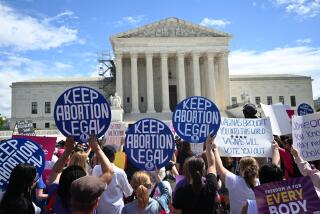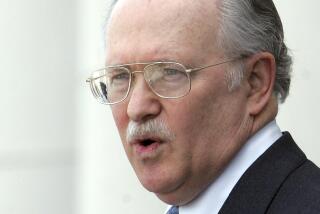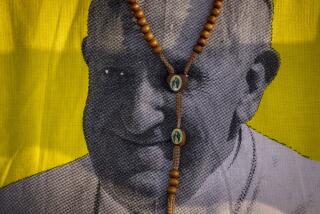Opinion: No separation of church and state, please; we’re British
“It’s worse in England” is a comment I find myself making fairly often, usually when a fellow American journalist complains about restrictions on the press imposed by the Obama administration or a federal court. But I’d make the same observation to Catholics, evangelicals and others who claim that religious freedom is under siege in this country (a sentiment that has abated a bit with the Supreme Court’s Hobby Lobby decision).
Even American politicians who condemn the Hobby Lobby decision take pains to make clear that they don’t want to meddle in the internal policies of churches and other purely religious institutions. There has been relatively little criticism of the Obama administration’s policy of exempting churches from the contraception mandate.
Likewise, even the most feminist American politicians would be reluctant to argue publicly that the Roman Catholic Church should ordain women as priests and bishops, let alone that laws against sex discrimination in hiring be applied to the church.
Now for the compare and contrast with England: This week the Synod of the Church of England approved the ordination of women as bishops. (Women have been ordained as priests since 1994.) Among the prominent figures praising the move were Prime Minister David Cameron and Deputy Prime Minister Nick Clegg.
Cameron said that the vote was “a great day for the church” — a sentiment he’s free to express as a member of the church — but he added that it was also a victory “for equality” generally. Clegg is not a believer (he has been described variously as an atheist and an agnostic), and he has advocated stripping the Church of England of its status as an established church. Nevertheless, he hailed the vote as “a watershed moment for the Church of England and a huge step forward in making our society fairer.”
Clegg added: “Allowing women to become bishops is another long-overdue step toward gender equality in senior positions.”
Well, yes. Like the office of deputy prime minister, a bishopric is a “senior position.” But it’s a position in a religious institution shaped by theological principles. The synod decided that those principles didn’t stand in the way of breaking with tradition and ordaining women as bishops; Anglicans on the other side of the debate argued (as Roman Catholics do) that by Jesus’ ordinance, only men can be successors to the all-male Apostles. But it seems odd that a politician who is a nonbeliever would take sides in an internal theological debate.
But in England there’s no 1st Amendment or “wall of separation” between church and state. That’s why the synod’s action must be approved by a committee of the British Parliament. In the past, Parliament has legislated on revisions in the Book of Common Prayer and whether the Church of England may perform same-sex marriages. Government also plays a role in religious schools that would be considered intrusive in this country.
American evangelicals and Catholics who cry wolf about threats to religious liberty posed by civil gay marriage or a contraceptive mandate for health insurance plans should look across the pond and count their blessings.
Follow Michael McGough on Twitter @MichaelMcGough3
More to Read
A cure for the common opinion
Get thought-provoking perspectives with our weekly newsletter.
You may occasionally receive promotional content from the Los Angeles Times.







